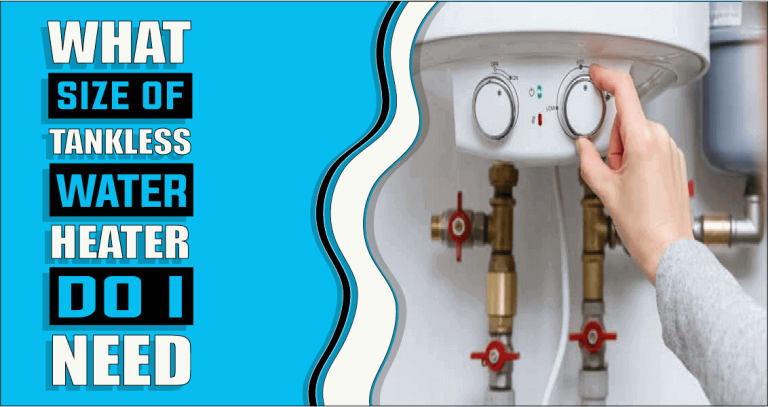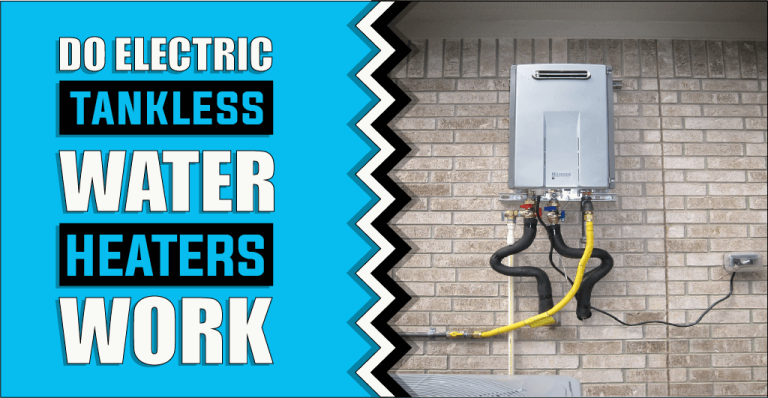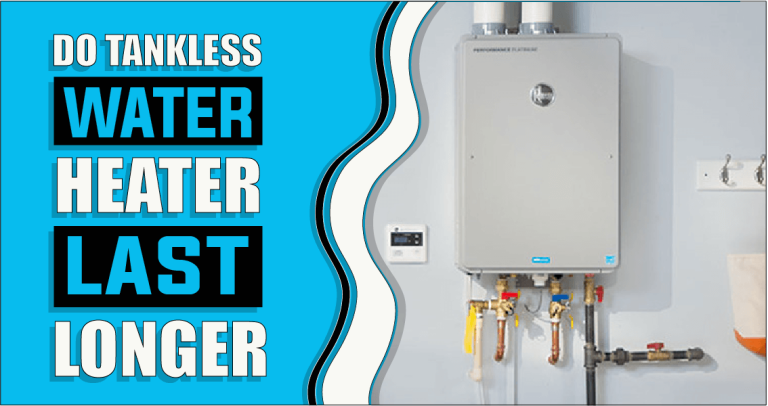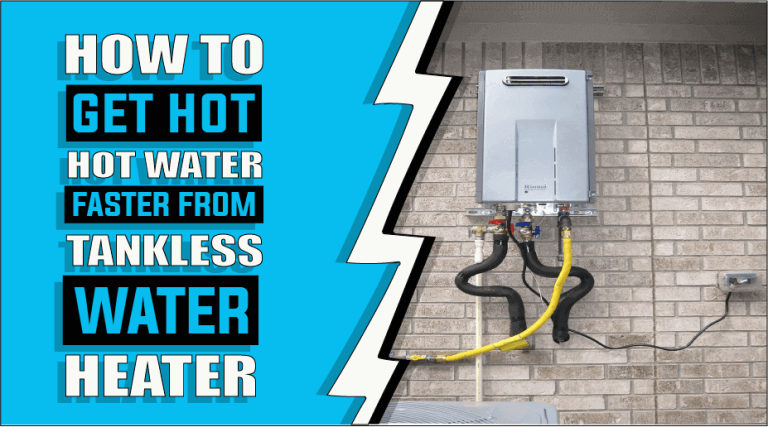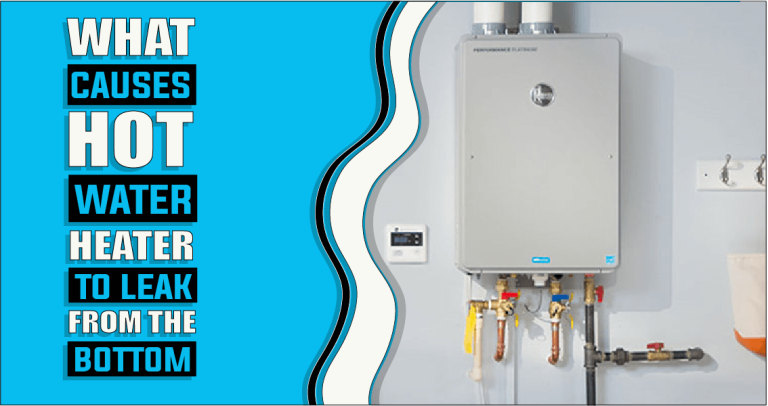What Is Tankless Hot Water Heater – The Truth Reveals
Are you often left frustrated by running out of hot water in your home? Are you trying to find a solution to reduce your energy and utility costs? So perhaps it’s time to think about buying a tankless water heater. These efficient machines are perfect for homes of all sizes and can provide an endless flow of hot water instantly, no more waiting for that old heater to fill up the tank! This blog post will go into great detail on what is tankless hot water heater, what makes them unique, how they operate, what advantages they have, and where you can buy one. Ready to find out more about tankless heating technology? Let’s jump right into it!
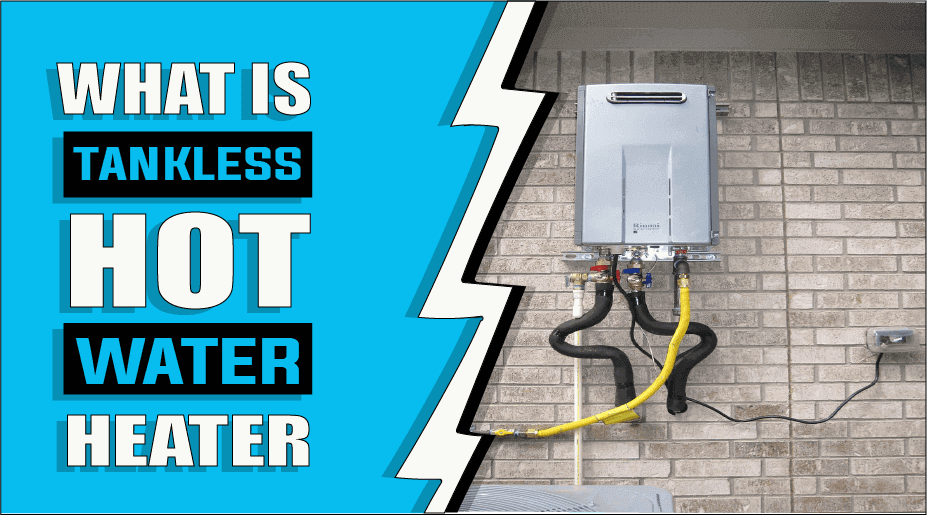
Let’s explore what is the tankless hot water heater.
An effective and economical replacement for conventional water heaters that provide limitless hot water on demand is a tankless water heater. This type of system operates without a storage tank, meaning fewer energy costs and a smaller overall footprint. As opposed to its traditional counterpart, which needs to constantly heat and reheat stored water in the tank, a tankless water heater only heats the volume of water that is being used at any given time. This not only lowers energy use but also offers continuous hot water for however long you use it.
In addition, these units are often more compact than conventional systems, making them an ideal choice for tight spaces such as garages or apartments. Additionally, they require less maintenance since they don’t have a storage tank and can last 10-15 years depending on usage and environment. With all of these advantages, it is easy to see why many people are opting for tankless water heaters when replacing their old unit or installing a new one.
Benefits of Having a Tankless Hot Water Heater
The days of running out of hot water are over! Having an endless supply of hot water is a pleasure you may experience with a tankless heater. Not only will your family never be left with chilly showers again – but they’re also incredibly efficient and cost-effective too. So why not upgrade today?
1: An Endless Supply of Hot Water
A tankless water heater is an ideal solution for households that need an unlimited flow of hot water. By utilizing a heat exchanger, this system heats cold water on demand and delivers it directly to taps and fixtures, so you’ll never run out of hot water again!
2: Reduced Energy Costs
One of the primary advantages of a tankless water heater is its remarkable energy efficiency; these systems can save up to 30% on your energy bill compared to traditional models. These energy savings comes from the fact that tankless systems don’t continually draw power to maintain the temperature in a large storage tank like those found in conventional units. Rather, they only activate when necessary and quickly shut off when you’re done using hot water, meaning no wasted energy.
3: Smaller Unit Size
The size difference between a traditional water heater and its tankless counterparts is significant; whereas traditional units typically measure around 60 inches tall, most tankless varieties are just under 20 inches in height, making them perfect for smaller installations where space is limited.
Additionally, their small size allows them to be easily installed outdoors or inside cabinets without having to make room for bulky tanks or pipes running back and forth between walls and ceilings.
4: Precise Temperature Control
With a tankless system, users have full control over the output temperature ranging from 85°F up to 140°F or higher depending on your specific model. Having precise control over your heater’s output temperature allows for optimal comfort levels as well as greater efficiency so that you’re not wasting money on unnecessarily heated water.
5: Longer Lifespan and Lower Maintenance Requirements
Tankless Hot Water Heaters usually boast lifespans twice as long as 20 years, as they don’t suffer from corrosion issues nor do they require regular draining or flushing like conventional models do every 6 months.
Furthermore, Tankless units require much less maintenance overall due mainly to their lack of moving parts meaning fewer scheduled service visits saving homeowners both time & money while ensuring consistent performance throughout their lifespan!
How Does a Tankless Hot Water Heater Work?
An effective, on-demand heating system, a tankless water heater produces hot water when needed without the need to store large volumes of heated water in a tank. It works by using special heating elements within the unit that are activated whenever there is a demand for hot water. This allows the user to have greater control over their flow rate and temperature settings, as they can more precisely dial in the desired temperature and flow rate of water based on their individual needs and preferences.
The fuel source for tankless water heaters can either be natural gas or electric power. Natural gas-powered models provide a more consistent source of heat and are often cheaper to operate than electric models, however, may require additional safety measures such as ventilation for proper installation depending on local building codes. Electric models, on the other hand, are typically easier to install with fewer safety considerations but can be more expensive to run due to higher energy consumption from electricity costs.
These efficient, modern systems can also help reduce energy consumption compared to traditional storage tank models while also offering better flow rates and temperature control through the use of special internal heating elements and controllers. The units are designed to monitor incoming cold water pressure while allowing users to adjust their preferred settings for both temperature and flow rate without having to constantly manually adjust them whenever their needs change. Additionally, some advanced tankless systems even come complete with built-in sensors which detect changes in incoming cold water pressure as well as fluctuations in ambient air temperature to further optimize efficiency levels for maximum performance.
Advantages of Tankless Hot Water Heaters
A tankless water heater is a great solution for providing an endless supply of warm, soothing showers. With no storage tank necessary, you can say goodbye to cold shocks and unexpected bill spikes, not to mention fewer worries about rust damage or leakage! Plus, with its compact size and smart energy-saving capabilities, this innovative device gives you some advantages.
1: Can be Installed Indoors or Outdoors:
Tankless water heaters can be built indoors or outside, depending on the model. This gives users more flexibility in their choice of installation location and assists in finding a solution that best meets the household’s needs.
2: Added Peace of Mind Due to Built-in Safety Features:
Many tankless water heaters come equipped with built-in safety features such as temperature limiters and oxygen depletion sensors that can help protect your home from potential accidents.
3: Easy Scheduling Options Due to Their Smart-System Capabilities:
With the advances in technology, many tankless water heaters are now equipped with smart-system capabilities which allow users to set specific schedules for when they want their heater to turn on and off. This can help save energy costs by only running the system when it’s needed and ensure that you never run out of hot water during peak times.
4: Increased Reliability and Fewer Repairs Needed:
Tankless water heaters are known for being highly reliable, meaning fewer repairs will be needed over time compared to traditional tank systems. And these systems are designed with long-term use in mind!
5: Ability to Monitor Performance with an App:
Unlike traditional storage tank systems, many modern tankless water heaters offer app-based performance monitoring capabilities. These apps allow you to monitor the temperature of your system in real-time and make adjustments as needed right from your smartphone or tablet device, regardless of where you are!
6: Lower Installation Costs Compared to Traditional Systems:
Not only do tankless water heaters provide greater peace of mind due to their additional safety features and reliability; but they also tend to cost less than traditional storage tanks when it comes time for installation fees. This makes them a great option for households looking for an affordable yet effective solution for their heating needs!
Disadvantages of Tankless Hot Water Heaters
Tankless water heaters sound like a great idea, but they aren’t without their drawbacks. In particular, tankless systems can be quite costly to install and maintain; you will also have less peace of mind in terms of potential power outages or other unexpected events that could disrupt your hot water supply.
1: Limited Hot Water Capacity:
One of the main disadvantages of tankless water heaters is that they have a limited capacity when it comes to producing hot water. These units typically only provide two to three gallons per minute, whereas traditional tank-style water heaters can produce up to five or more gallons per minute. This means that if you need large amounts of hot water at once, such as for multiple showers, a tankless model will not be able to keep up with demand and may not satisfy everyone’s needs.
2: High Initial Cost:
Another drawback of tankless water heaters is that their initial cost can be quite high compared to traditional models. Installation costs are also much higher because more complex venting must be set up for the unit to work properly. Some homeowners who are on a budget could find the added cost to be too much.
3: Power Outage:
Tankless water heaters may not be a reliable option for households that experience frequent power outages. This is because these units require electricity to run, and so if the power goes out your hot water system will also shut down until it is restored. You could not have access to hot water during this period, depending on how long the interruption lasted.
The Installation Cost of a Tankless Water Heater
A tankless water heater’s installation price might vary significantly depending on the heater’s kind and how complicated the installation is. Generally speaking, tankless units tend to cost more to install than traditional tank-style heaters due to the complex venting requirements. Depending on the specific model, installation costs can range anywhere from $800-$2,500 or more.
In addition, larger homes with longer piping runs may have higher labor costs associated with their installation compared to smaller homes with shorter plumbing lines. Generally speaking, typical installation costs for an electric tankless water heater range from $800 to $1,500, while gas-powered units may cost anywhere from $1,000 to $2,000 or more.
Proper installation depends on many factors like local building codes, proper venting, and the type of tankless water heater you select. As such, it is always recommended that you contact a licensed plumber for installation as they will ensure that everything is installed correctly and by local regulations.
Maintenance of Tankless Hot Water Heater
The maintenance of a tankless water heater is essential for ensuring that it runs efficiently and safely. The manufacturer’s instructions or at least once a year should be followed when doing routine maintenance. Maintenance typically includes checking the water pressure, removing any sediment from the heater, and flushing out the system to remove any scale or other contaminants that have built up over time. During maintenance, it is also important to inspect all connections and ensure they are securely fastened and not leaking. Additionally, filters need to be replaced regularly depending on use.
Overall, tankless water heaters can be a terrific method to reduce your energy usage and monthly expenditures. Tankless water heaters may be a terrific addition to any house with the right research, installation, and upkeep!
Frequently Asked Questions
Tankless water heaters’ restricted flow rate is their biggest flaw. These units typically only provide two to three gallons per minute, whereas traditional tank-style water heaters can produce up to five or more gallons per minute.
It is conceivable, yes. Tankless water heaters rely on a limited flow rate, which may not be able to keep up with demand and may not satisfy everyone’s needs. A single tap won’t accomplish this; you can take as many showers as you like and the water will remain hot.
A tankless water heater’s installation price might vary significantly depending on the heater’s kind and how complicated the installation is. Generally speaking, tankless units tend to cost more to install than traditional tank-style heaters due to the complex venting requirements. Depending on the specific model, installation costs can range anywhere from $800-$2,500 or more.
Tankless water heaters don’t keep hot water in storage as conventional tank-style water heaters do. Instead, they quickly warm the water as it passes through them, generating a steady stream of hot water. This eliminates the need to constantly reheat stored water and provides energy savings over time.
Tankless water heaters do tend to cost more in terms of energy usage than traditional tank-style heaters. However, the long-term savings can be significant because tankless water heaters only run when hot water is needed, rather than constantly reheating stored water.
Yes, it is recommended that you flush a tankless water heater at least once a year to remove any sediment and scale buildup. This will ensure efficient operation and help prolong the life of the unit.
The ideal tankless water heater for you will rely on your requirements. Generally speaking, gas-powered tankless water heaters tend to be more efficient and cost less in terms of energy usage than electric models.
Conclusion
I hope you enjoyed this article on what is the tankless hot water heater. A tankless water heater is an excellent long-term energy and financial investment. Tankless water heaters do not store hot water; instead, they instantly heat the water as it passes through them, in contrast to conventional tank-style water heaters. They require regular maintenance to ensure efficient operation, including checking the water pressure, flushing out any sediment from the heater, and replacing filters as needed. You may have an unending supply of hot, clean water for many years to come with the right research, installation, and maintenance of a tankless water heater!
So get a tankless water heater immediately to enjoy the ease of unlimited hot water! Forget about dealing with large tanks and limited capacity, as this innovative new system provides instant access to warm up any space. No matter if you’re running your morning shower or washing dishes after dinner – never go cold again thanks to modern technology!
Ella John is passionate about helping her readers make the best choice when purchasing a heater. She understands that selecting a heater can be difficult and strives to provide information to help make the decision easier. Ella’s website, Heatersinfo.com, provides valuable insight into heating trends and types of heaters and tips on how to care for them. She also advises selecting the right heater based on individual needs and preferences. Her expertise in electronics makes her an excellent source of knowledge, and she is confident that anyone who visits her website will find the perfect heater information for their needs. Ella’s dedication to helping others make educated decisions about buying the right heater is unparalleled, and she hopes to continue offering her expertise for many years. With Ella’s help, finding the perfect heater can be a breeze!

